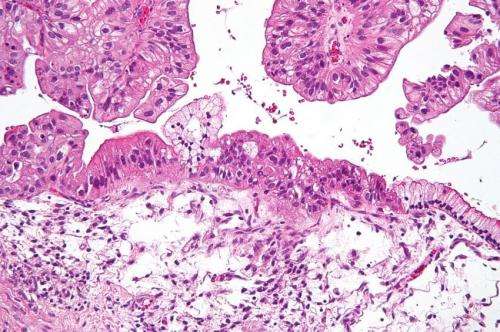This article has been reviewed according to Science X's editorial process and policies. Editors have highlighted the following attributes while ensuring the content's credibility:
fact-checked
peer-reviewed publication
trusted source
proofread
Revolutionizing ovarian cancer treatment with adaptive PARP inhibitor therapy

Ovarian cancer, often diagnosed at an advanced stage, presents significant treatment challenges because patients tend to develop resistance to conventional therapies quickly. Despite aggressive treatment, recurrence rates remain high, and managing this disease effectively requires innovative approaches. Poly-adenosine ribose polymerase (PARP) inhibitors have emerged as a treatment option, targeting specific DNA repair mechanisms in cancer cells. However, their use is often limited by toxicity and emerging drug resistance.
A new study led by researchers at Moffitt Cancer Center introduces an adaptive therapy approach that could optimize PARP inhibitor maintenance therapy, offering a more personalized and potentially less toxic treatment option for patients. Their work is featured as the cover article of the June 19 issue of Cell Systems.
PARP inhibitors are a targeted therapy that block a protein that helps repair damaged DNA. This can keep cancer cells from repairing themselves once they've been damaged by chemotherapy, resulting in cancer cell death. Despite their effectiveness, traditional dosing methods of administering the maximum tolerated dose often result in severe side effects and dose reductions, compromising treatment efficacy.
Moffitt researchers utilized mathematical modeling and in vitro experiments to compare adaptive dosing strategies. They developed a model to test various adaptive schedules and found that dose modulation based on tumor response was superior to skipping doses.
"Adaptive therapy tailors treatment to the tumor's dynamics, allowing us to adjust drug levels to match a patient's specific disease characteristics," said Alexander Anderson, Ph.D., study author and chair of the Integrated Mathematical Oncology Department at Moffitt. "Our findings suggest that modulation, rather than skipping doses, can halve the amount of drug used while maintaining its effectiveness. This approach reduces toxicity and can potentially delay the development of resistance."
The team conducted time-lapse microscopy to observe ovarian cancer cell populations under different treatment schedules. Their model revealed that continuous dose modulation effectively managed the tumor using significantly less medication than traditional methods. In vivo experiments confirmed these results, demonstrating the practical viability of the adaptive approach. While the results are promising, the research continues to validate and refine adaptive therapy strategies.
"A mathematical modeler by training, this project gave me the unique opportunity to conduct my own in vitro experiments to calibrate and test my models. Not only was this a fun and rewarding experience, but it demonstrated to me the power of closely integrating theory and experiments," said Maximilian Strobl, Ph.D., lead author who conducted this work while pursuing a doctorate and postdoc at Moffitt. "I believe such an iterative and interdisciplinary approach will be crucial in developing more effective ways to schedule cancer treatment."
More information: Maximilian A.R. Strobl et al, To modulate or to skip: De-escalating PARP inhibitor maintenance therapy in ovarian cancer using adaptive therapy, Cell Systems (2024). DOI: 10.1016/j.cels.2024.04.003



















